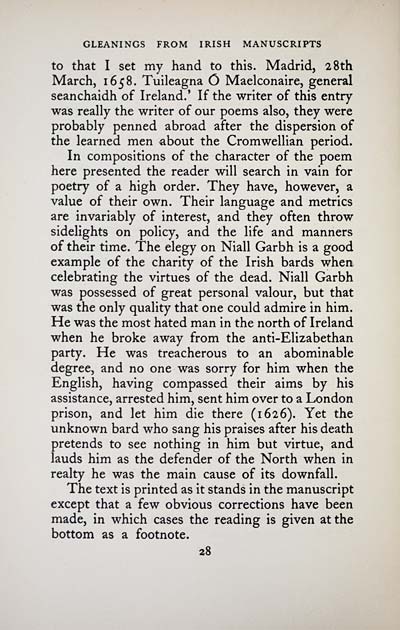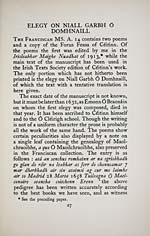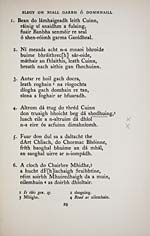Download files
Complete book:
Individual page:
Thumbnail gallery: Grid view | List view

GLEANINGS FROM IRISH MANUSCRIPTS
to that I set my hand to this. Madrid, 28th
March, 1658. Tuileagna Maelconaire, general
seanchaidh of Ireland.* If the writer of this entry-
was really the writer of our poems also, they were
probably penned abroad after the dispersion of
the learned men about the Cromwellian period.
In compositions of the character of the poem
here presented the reader will search in vain for
poetry of a high order. They have, however, a
value of their own. Their language and metrics
are invariably of interest, and they often throw
sidelights on policy, and the life and manners
of their time. The elegy on Niall Garbh is a good
example of the charity of the Irish bards when
celebrating the virtues of the dead. Niall Garbh
was possessed of great personal valour, but that
was the only quality that one could admire in him.
He was the most hated man in the north of Ireland
when he broke away from the anti-Elizabethan
party. He was treacherous to an abominable
degree, and no one was sorry for him when the
English, having compassed their aims by his
assistance, arrested him, sent him over to a London
prison, and let him die there (1626). Yet the
unknown bard who sang his praises after his death
pretends to see nothing in him but virtue, and
lauds him as the defender of the North when in
realty he was the main cause of its downfall.
The text is printed as it stands in the manuscript
except that a few obvious corrections have been
made, in which cases the reading is given at the
bottom as a footnote.
28
to that I set my hand to this. Madrid, 28th
March, 1658. Tuileagna Maelconaire, general
seanchaidh of Ireland.* If the writer of this entry-
was really the writer of our poems also, they were
probably penned abroad after the dispersion of
the learned men about the Cromwellian period.
In compositions of the character of the poem
here presented the reader will search in vain for
poetry of a high order. They have, however, a
value of their own. Their language and metrics
are invariably of interest, and they often throw
sidelights on policy, and the life and manners
of their time. The elegy on Niall Garbh is a good
example of the charity of the Irish bards when
celebrating the virtues of the dead. Niall Garbh
was possessed of great personal valour, but that
was the only quality that one could admire in him.
He was the most hated man in the north of Ireland
when he broke away from the anti-Elizabethan
party. He was treacherous to an abominable
degree, and no one was sorry for him when the
English, having compassed their aims by his
assistance, arrested him, sent him over to a London
prison, and let him die there (1626). Yet the
unknown bard who sang his praises after his death
pretends to see nothing in him but virtue, and
lauds him as the defender of the North when in
realty he was the main cause of its downfall.
The text is printed as it stands in the manuscript
except that a few obvious corrections have been
made, in which cases the reading is given at the
bottom as a footnote.
28
Set display mode to: Large image | Transcription
Images and transcriptions on this page, including medium image downloads, may be used under the Creative Commons Attribution 4.0 International Licence unless otherwise stated. ![]()
| Early Gaelic Book Collections > Matheson Collection > Gleanings from Irish manuscripts > (40) |
|---|
| Permanent URL | https://digital.nls.uk/76713052 |
|---|
| Description | Items from a collection of 170 volumes relating to Gaelic matters. Mainly philological works in the Celtic and some non-Celtic languages. Some books extensively annotated by Angus Matheson, the first Professor of Celtic at Glasgow University. |
|---|
| Description | Selected items from five 'Special and Named Printed Collections'. Includes books in Gaelic and other Celtic languages, works about the Gaels, their languages, literature, culture and history. |
|---|

